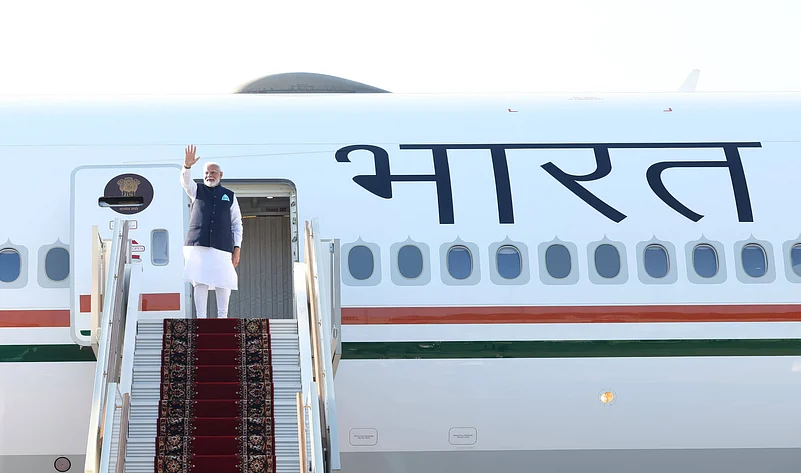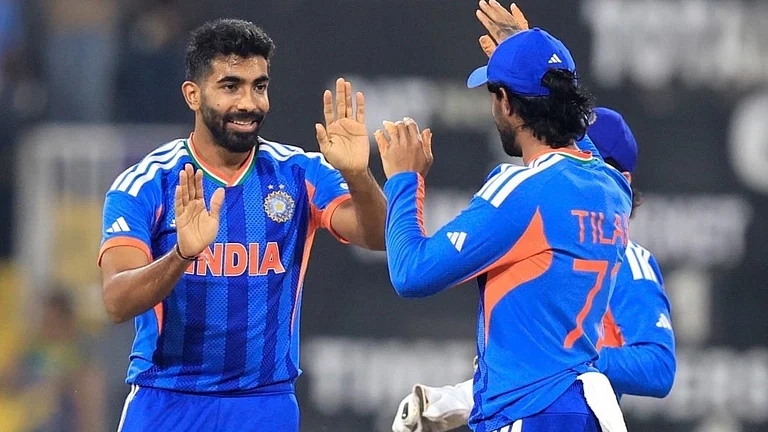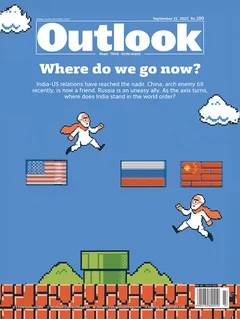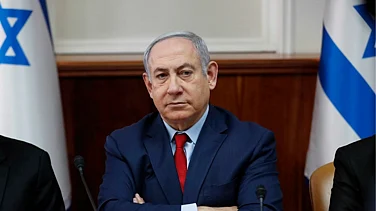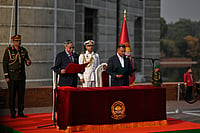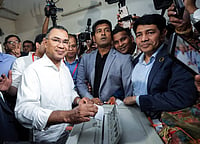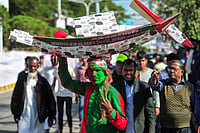
Summary of this article
- During a debate in the parliament in 2023, PM Narendra Modi claimed that the world’s trust in India has increased the self-confidence of the Indians.
- In 2024, the Modi administration claimed his intervention stopped the Russia-Ukraine war for a while for evacuation of Indian students.
- While the Modi government had branded India under their rule as Vishwamitra or Vishwabandhu, a friend of the world, Modi appeared friendless in the aftermath of the April 22 terror attack at Pahalgam.
In a social media post on March 10, India’s ruling force, the Bharatiya Janata Party (BJP), claimed that Prime Minister Narendra Modi was “boosting India’s global stature” and leading the country with “unmatched global recognition”. The conferring of “20 prestigious international honours” upon him reflect “not only his leadership, but also the rising stature of 140 crore Indians on the global stage.”
In short, Modi, by winning friends, awards and accolades around the world, posing with heads of states and governments, has brought pride to 140 crore Indians. Every Indian has their stature raised globally and Indians should be proud of what Modi has been doing abroad.
In exactly two months—May 10—clippings from a 55-year-old video flooded India’s social media sphere, ostensibly to demonstrate before India’s Hindu nationalist ecosystem how an Indian Prime Minister is expected to deal with foreign powers.
“Times have passed when any nation sitting three or four thousand miles away could give orders to Indians on the basis of colour superiority to do as they wished,” Prime Minister Indira Gandhi was heard telling in that 1971 message to US President Richard Nixon. Modi’s critics highlighted how Gandhi went ahead with the war to bifurcate Pakistan, defying warnings from the US and China.
That day, May 10, US President Donald Trump caused PM Modi one of the latter’s greatest embarrassments. He not only announced the Indo-Pak ceasefire before India did, but also claimed credit for getting the two warring sides to stop firing at each other, that too by using trade prohibition threats.
Under Modi rule, the Hindu nationalist ecosystem has systematically used ‘India’s rise in global stature under Narendra Modi’ for domestic political benefits. During a no-confidence motion debate in the parliament in 2023, Modi himself claimed that the world’s trust in India has increased the self-confidence of the Indians. In 2024, the Modi administration claimed his intervention stopped the Russia-Ukraine war for a while for evacuation of Indian students.
Trump’s claim of credit for stopping the India-Pakistan conflict generated dozens of fun-poking memes shared thousands of times. It also allowed the opposition to raise serious questions about India’s policy and decision-making independence.
If Trump’s anti-Muslim rhetorics made India’s Hindu nationalist establishment assess him as a natural ally against terrorism, Trump has made it evident that he values Pakistan much more than India would have liked him to.
Besides, while the Modi government had branded India under their rule as Vishwamitra or Vishwabandhu, a friend of the world, Modi appeared friendless in the aftermath of the April 22 terror attack at Pahalgam. Nations and multilateral platforms condemned the terror attack and expressed their solidarity with India, but without naming Pakistan, forget blaming it for sheltering terrorists.
Congress president Mallikarjun Kharge pointed out that Modi had made 151 foreign trips and visited 72 countries since 2014 and 10 of these visits were to the US. “Yet, our country stands alone under the Modi government’s foreign policy,” Kharge said.
Trump, Modi’s self-proclaimed friend, whose administration was expected by India’s policymakers to meddle less in India’s domestic affairs, especially over sensitive issues like religious discrimination and persecution of minorities, embarrassed Modi on much larger issues—national security and global standing.
If Trump’s anti-Muslim rhetorics made India’s Hindu nationalist establishment assess him as a natural ally against terrorism, Trump has made it evident that he values Pakistan much more than India would have liked him to. Trump dined with Asim Munir, the Pakistan army chief—India’s effective Enemy Number 1.
The isolation became more evident with time. Despite sending multi-party delegations to lobby United Nations Security Council (UNSC) members, India failed to prevent Pakistan’s elevation to chair the UNSC Taliban Sanctions Committee and vice-chair of the Counter-Terrorism Committee.
Despite India’s objections, Pakistan received a bouquet of loans—from the International Monetary Forum (IMF), the World Bank and the Asian Development Bank (ABD). When India was expected to isolate Pakistan in the global dynamics for its harbouring of terror groups, India appeared to be standing isolated.
The tariff war over Indian purchase of Russian oil defying Western sanctions complicated the Modi-Trump chemistry further.
And, in August, Modi had to highlight friendship with China, which has not only been the prime target of India’s Hindu nationalist ecosystem for domestic-narrative building over the past few years but also, in a much serious context, India’s assertive neighbour, a powerful border security threat and one of Pakistan’s closest friends.
But it’s not only global big powers like the US and China that stood firmer by Pakistan than by India. India also failed to become a voice of the Global South, a claim that the Modi administration repeatedly made.
At a time when Israel’s war on Gaza is becoming a globally polarising issue, China’s aggressive pro-Palestine stance appears to have helped it earn a bigger stature as the Global South’s voice. India, on the other hand, has shifted from its traditional pro-Palestine stance and built closer bonds with Israel.
On September 9, Communist Party of India (Marxist) leader and Kerala chief minister Pinarayi Vijayan “strongly condemned” the Union Government’s decision to host Israeli Finance Minister Bezalel Smotrich, describing him as “a far-right extremist and a chief architect of Israel’s brutal occupation and expansionist agenda.”
Vijayan said that at a time when a genocide is unfolding in Gaza, entering into agreements with representatives of the Benjamin Netanyahu regime is nothing short of a betrayal of India’s historic solidarity with Palestine. “It is deplorable to maintain military, security, and economic ties with Israel while the path to a just and lasting peace for Palestine remains unpursued,” Vijayan said.
While Hindu nationalist fascination for Israel’s attitude towards West Asia’s Muslim-majority nations is a reason behind the closer Indo-Israel ties, weapons and technologies also appeared to have trumped any ideological components over Gaza–perhaps, the worst genocide of the 21st century.
Going by Foreign Minister S Jaishankar’s versions, national security and neighbourhood tops Modi’s government’s foreign policy priorities. In his Independence Day speech in 2019, Modi, too, said that India needs to “unite all forces to expose those who give shelter to terrorists, those who encourage terrorism and those who export terrorism.”
As of 2025, India’s influence in its backyard of South Asia has waned. Relations with Bangladesh have almost hit rock bottom, especially with India’s backing of ousted PM Sheikh Hasina.
In a December 2024 speech, he revisited the priorities in five points: border security and terrorism remained the top priority, followed by national development through economic diplomacy, supply chain reformulations, connectivity in the shape of corridors (like India-Middle East Economic Corridor and International North-South Transport Corridor), and formulating policies suitable for a world order that no longer encourages strong and lasting alliances and only has agenda-based partnerships.
He clarified that India aims for a system of strategic autonomy combined with multilateral cooperation. The government wants to achieve the targets by a mix of offense, defense, hedging, prudence, joining in rebalancing, participating in re-globalisation, taking advantage of interdependence and accelerating multipolarity.
The question is, in a rapidly shifting, multipolar world, did Modi’s administration overestimate India’s leverages?
As of 2025, India’s influence in its backyard of South Asia has also waned. Relations with Bangladesh have almost hit rock bottom, especially with India’s wholehearted backing of ousted Prime Minister Sheikh Hasina and her continued presence in India for over a year. Meanwhile, the influence of China, Pakistan and Turkey (suspected as a US proxy by some experts) continue to grow in Bangladesh.
India’s internal troubles in the Myanmar-bordering northeastern states of Manipur, Nagaland and Mizoram over policies like restricting the Free Movement Regime (FMR), border fencing and citizenship screening has complicated its challenges in Myanmar, where rebel groups with ethnic ties in India are currently holding much of the India-bordering areas.
In both Maldives and Sri Lanka, China is giving India a tough competition for influence. India’s relations with Nepal, a close cultural and historical ally, deteriorated after the 2015 constitutional crisis when India was accused of meddling in Nepal’s affairs. Despite repeated repairs efforts, the rifts have resurfaced time and again, including on issues like border dispute, coupled with China’s growing influence.
India’s sway on other multilateral organisations do not appear to be sound either.
While India has not been able to build a viable alternative to SAARC for South Asian regional coordination, there are signs of an emerging China-Pakistan-Bangladesh block. Meanwhile, China’s Belt and Road Initiative (BRI) has helped Beijing take its footprints across South Asia, Central Asia, and Africa. In BRICS, China has emerged as the dominant force. India’s attempts to counterbalance China through Quadrilateral Security Dialogue (QUAD) has not earned any visible results yet.
India is investing time, energy and resources on the I2U2 grouping comprising India, Israel, the UAE, and the United States, a collaboration launched in 2022 focusing explicitly on economic and technological cooperation sans any security-related issue. India is also trying to deepen ties with the Caribbean Community (CARICOM) grouping.
However, as of September 2025, India’s own initiatives like the International Solar Alliance and the India-Middle East-Europe Economic Corridor (IMEC) remain dwarfed by China’s BRI.
In 2019, from a rally in Gujarat after BJP’s Lok Sabha win, Modi said the huge mandate that India gave him had created “an opportunity for another renaissance that will make India a Vishwaguru—guru to the world”. Gradually, India rebranded itself as Vishwamitra or Vishwabandhu—a friend to the world.
In his 2023 Independence Day speech, Modi sounded more confident when he said: “Today, India is becoming the voice of the Global South.” A month later, On September 18, 2023, Modi told Parliament that “it is a matter of pride for all that India has carved a place for itself as ‘Vishwa Mitra’ and the entire world is seeing a friend in India.”
In a December 2024 address, Jaishankar elaborated more on branding or positioning. He said that foreign policy for Viksit Bharat, developed a decade ago, “suggested the need for India to start thinking of moving towards a leading power.” Contending that the advancements are “also about positioning,” he explained, “A country will move ahead if it has, in a sense, the most friends, the least problems, the best relationships, the minimal baggage.”
It is in this positioning or branding that the concept of Vishwabandhu came about—“a country which, in a way, is friends to all, or nearly all, you can say, friends to the maximum.”
No doubt, India’s G20 presidency was a notable success. The induction of the African Union (AU) as a permanent member, in particular, demonstrated India’s commitment to being a voice for the Global South. However, India’s inability to take any position on crucial matters like Israel’s war on Palestine, the Russia-Ukraine war or the global north’s refusal to compensate the world for the damage they have caused by accelerating global warming has not helped its ‘friend of the world’ branding. Little wonder that India failed to secure support for a permanent seat for itself in the UNSC.
MORE FROM THIS ISSUE
Snigdhendu Bhattacharya is a journalist, author and researcher


